Green taxonomy certification can help Vietnam attract funds for sustainable development: experts
The urgency of developing a legal framework to develop green credit and green bonds in order to attract funds for sustainable development was stressed by experts at a seminar Wednesday.
The seminar was hosted in Hanoi by The Investor and the Institute of Strategy and Policy on Natural Resources and Environment under the Ministry of Natural Resources and Environment.
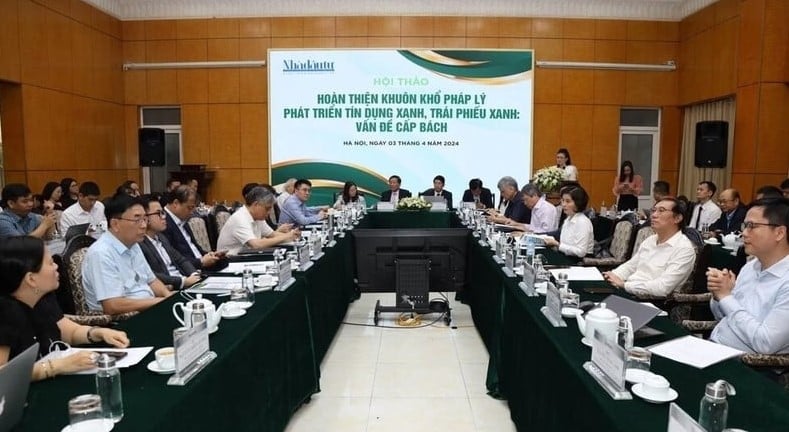
The Investor hosts “A matter of urgency: Completing the legal framework to develop green credit, green bonds” seminar in Hanoi, April 3, 2024. Photo by The Investor/Trong Hieu.
Nguyen Dinh Tho, head of the institute, said that the government's Decree 08/2022, incorporating suggestions from the Ministry of Natural Resources and Environment, stipulates classification details and criteria for green credits and green bonds.
Vietnam sought to learn from international norms and practices in the field to set its own rules, including those that require green projects in the country to ensure application of the circular economy model, extension of product life, reduced emissions, environmental protection, biodiversity protection and climate change adaptation, he added
The ministry was considering three options for recognition of green practices.
First, the State Bank of Vietnam, the Ministry of Finance and several foreign agencies were backing the option of letting independent organizations approve the recognition.
Second, a state agency like the Ministry of Natural Resources and Environment and its departments would be responsible for approving projects at different scales.
Third, credit institutions would themselves provide the recognition during loan assessment.
The first option was global practice and the favored one, Tho said.
There were problems to consider when drafting regulations for the process, including the possibility that projects may not remain green after obtaining the recognition; and that fraud can be perpetrated to obtain it.
Another possibility is that failure to attain the green status can force firms to leave the market, Tho said, citing the textile-apparel sector as an example.
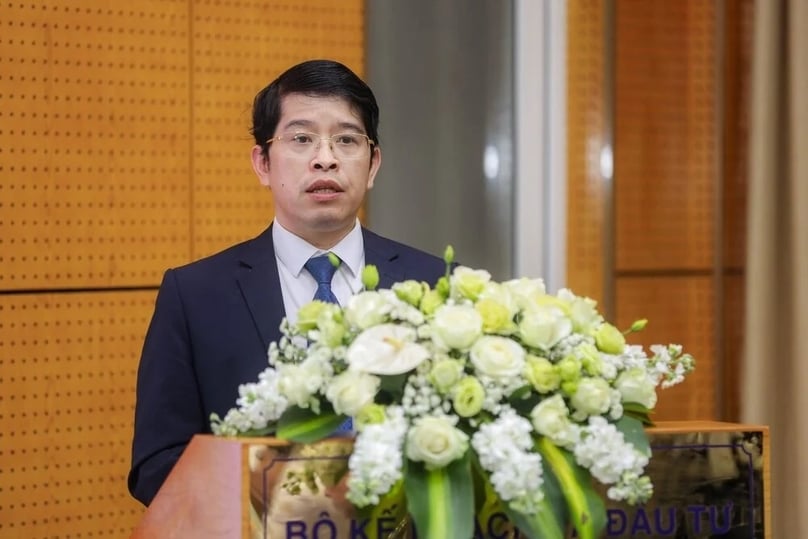
Nguyen Dinh Tho, head of the Institute of Strategy and Policy on Natural Resources and Environment, under the Ministry of Natural Resources and Environment. Photo by The Investor/ Trong Hieu.
Green taxonomy
Nguyen Anh Tuan, editor-in-chief of The Investor, noted that green and sustainable growth was a consistent and major national policy in Vietnam. He also cited an Asian Development Bank (ADB) estimate of Vietnam needing $368 billion until 2040 to meet its green growth targets, equivalent to around $20 billion a year.
Since 2017, Vietnam’s green credit market has grown by over 20% per year, according to the ADB. Meanwhile, according to the Ministry of Finance, Vietnam issued about $1.16 billion worth of green bonds in 2019-2023, just a fraction of the $20 billion demand, Tuan said.
He said one of the factors hindering development of the green credit and green bond markets in Vietnam was an incomplete legal framework, especially the lack of environmental regulations, criteria and a national green taxonomy.
For example, Decree 08/2022 stipulated that the Ministry of Natural Resources and Environment would lead and coordinate with relevant ministries and agencies the effort to draft regulations on environmental criteria and projects eligible for green credit and green bond issuance by end-2022. However, this task has still not been completed because of disagreements among agencies, negatively impacting the green transformation process including green credit and green bonds, Tuan said.
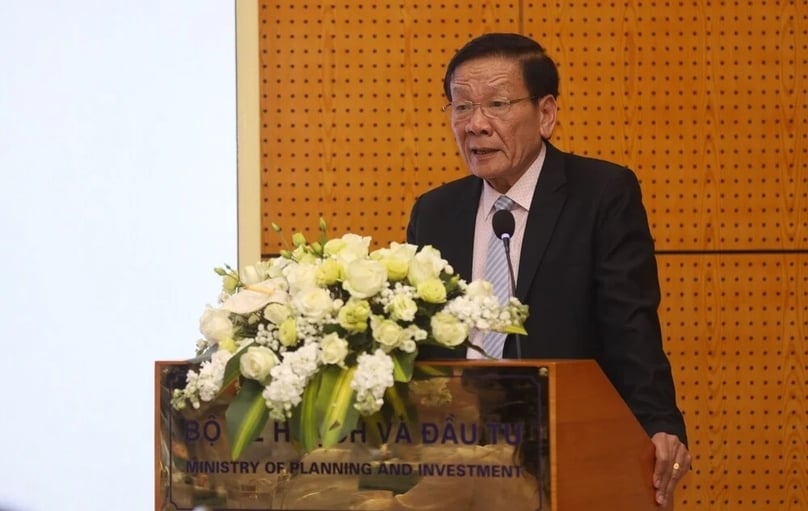
Nguyen Anh Tuan, editor-in-chief of The Investor. Photo by The Investor/ Trong Hieu.
Modest green credit
Pham Thi Thanh Tung, deputy head of the Department of Credit for Economic Sectors, the State Bank of Vietnam, said green credit was still modest in Vietnam and proposed solutions to ensure stronger growth.
Green and sustainable growth was a key model for many countries because it had the potential to help overcome economic downturns, population overgrowth, depletion of natural resources, biodiversity loss, environmental pollution, and climate change.
Vietnam, as one of the countries most vulnerable to climate change, stands to benefit greatly from green growth, Tung stressed.
Per this goal, the banking sector was striving to direct and facilitate credit investment flows into green, eco-friendly projects. The sector was pushing all banks to build internal rules on environmental and social risk management in credit activities; on assessment of environmental and social risks in lending activities; and setting environmental standards for projects funded by banks.
The State Bank of Vietnam has also urged commercial banks to focus resources on green projects and climate change adaptation activities.
In 2017-2023, the outstanding balance of green credit in Vietnam recorded an average annual growth rate of over 22%. As of end 2023, there were 47 financial institutions with outstanding green credit balances totaling VND620.98 trillion ($24.83 billion), representing a 24% year-on-year increase. This accounted for 4.5% of the total outstanding debt in the economy, primarily focused on renewable and clean energy (45% of the total) and green agriculture (30%).
Credit institutions have developed green credit packages and green credit programs. As of end-2023, credit institutions assessed environmental and social risks for loans of VND2,840 trillion ($113.55 billion), or 20% of the lending in the economy, up 20% year-on-year.
However, the banking sector faced a major challenge: the lack a green taxonomy as the central bank's guidance, issued in 2017, was now outdated. The State Bank of Vietnam has called on relevant agencies to collaborate and expedite the formation of a legal framework on green taxonomy, with details for different sectors, Tung said.
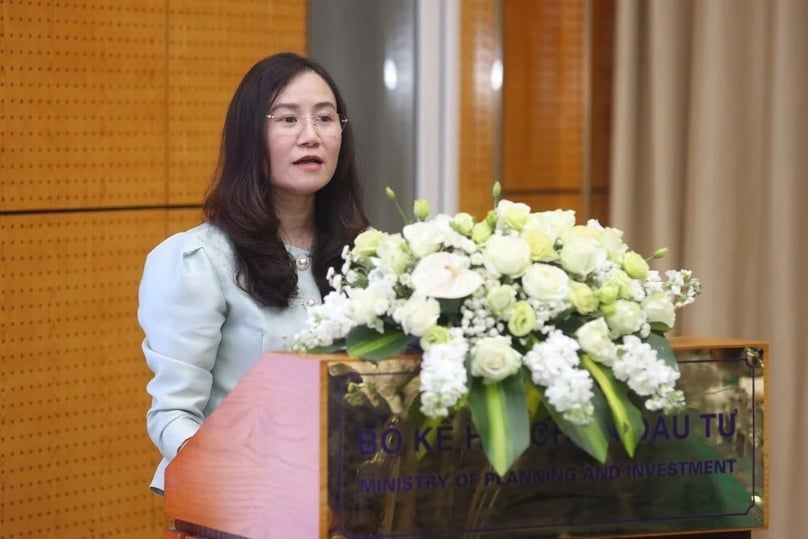
Pham Thi Thanh Tung, vice head of the Department of Credit for Economic Sectors, the State Bank of Vietnam. Photo by The Investor/ Trong Hieu.
Green credit challenges
Can Van Luc, chief economist with BIDV bank and director of the BIDV Research & Training Institute, said green finance remained a minor sector in Vietnam, with green credit accounting for just 4.4% of total lending and green bonds being even more limited. Luc also held an underdeveloped legal framework responsible for the situation.
While green projects are typically long-term ones (up to 20 years) with large investment outlays, financial institutions' major focus was on short-term and medium-term loans, against borrowers' preference of low interest, long-term loans.
The lack of detailed rules on green projects may discourage businesses or lead to green washing, Luc warned. He proposed solutions for speeding up the legal framework issuance, including identification of prioritized sectors (energy, transportation, industrial production, agriculture, tourism) and learning from other countries’ models like that of Malaysia.
Luc’s other suggestions included establishing rules on reduction or exemption of taxes and fees for green finance, simplification of administrative procedures, updates of green finance requirements and guiding regulations.
He also mentioned the need to develop a green corporate bond market, provide training courses for businesses, enhance dissemination programs, and encourage firms themselves to follow environmental, social and governance (ESG) reporting.
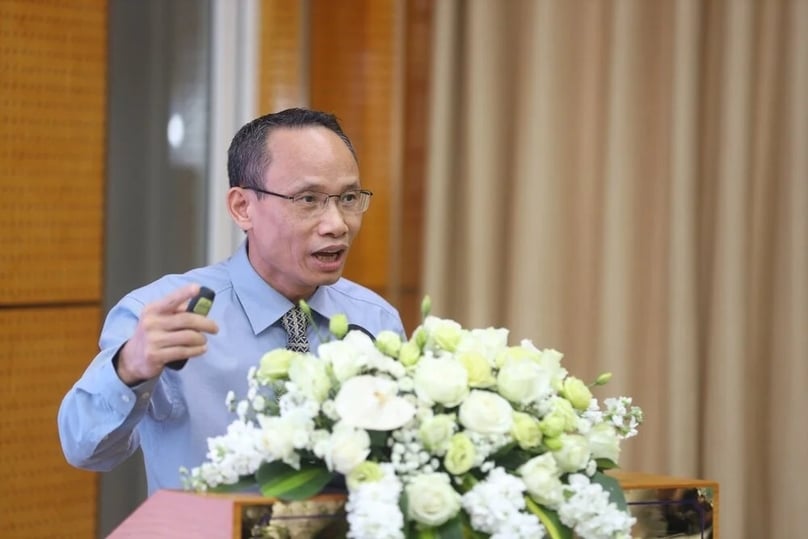
Can Van Luc, chief economist of BIDV and director of BIDV Research & Training Institute. Photo by The Investor/Trong Hieu.
Foster carbon market
Highlighting her bank’s green growth initiatives, Nguyen Thi Thu Ha, head of Agribank's training academy and deputy head of its ESG council, emphasized that the bank accounted for 70% of agricultural loans in Vietnam and was strongly connected to environment and water management in the country.
Agribank would separate its sustainable development report from its annual report in line with global practice, she said.
She said Agribank had some recommendations for authorities. The Ministry of Natural Resources and Environment should issue soon a list of criteria to help credit institutions determine if projects meet green credit requirements.
The government and ministries should also make rules to boost the carbon market including a carbon credit exchange; and build up a database on environmental violations committed by businesses in order to help credit institutions lend to suitable borrowers, she added.
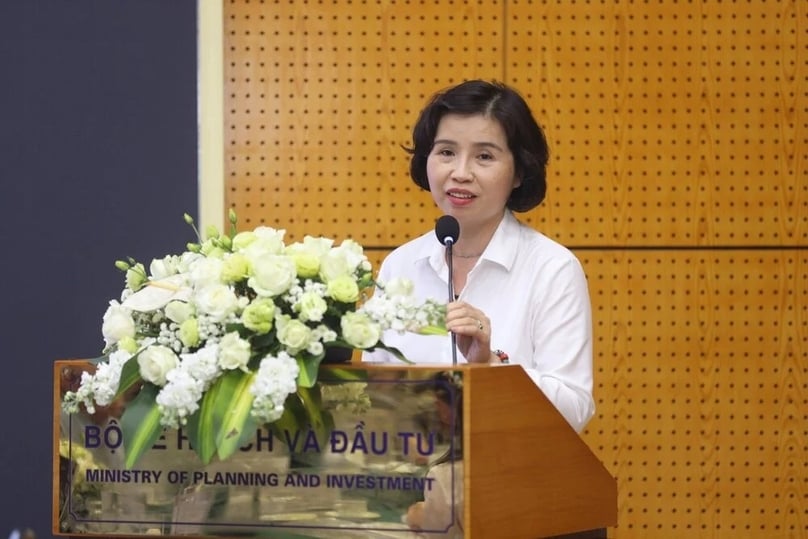
Nguyen Thi Thu Ha, head of Agribank's training academy and vice head of Agribank's ESG council. Photo by The Investor/Trong Hieu.
Green transformation struggles
Vietnam's legal framework on green growth was basically complete, but implementation was limited, due to the lack of a green taxonomy, said Bui Quang Tuan, head of the Vietnam Institute of Economics.
He noted problems including authorities' capacity to enforce the law, their weak support and interventions for green growth, weak investments in technology, and low awareness of green transformation.
While the credit sector was mainly focusing on agriculture and energy, Tuan felt it should also focus on construction, transportation and manufacturing-processing sectors, saying they would be key to achieving breakthroughs in green growth.
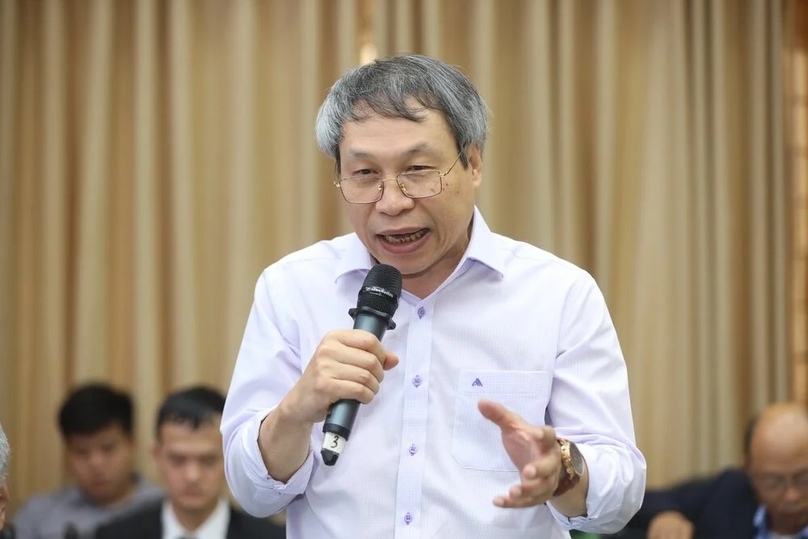
Bui Quang Tuan, head of the Vietnam Institute of Economics. Photo by The Investor/Trong Hieu.
Clarifying some issues, Pham Thi Thanh Tung, deputy head of the central bank’s Department of Credit for Economic Sectors, said green finance now covered 12 sectors including agriculture, forestry and renewable energy. However, some of the sectors were underdeveloped, like hydrogen. Therefore, a green taxonomy suitable for the Vietnamese economy was an urgent need, she added.
Nguyen Hai Anh, deputy CEO of Shinec JSC, operator of the Cau Kien Eco Industrial Park in Hai Phong city, said the legal framework was underdeveloped.
For example, banks had to have access to profitability reports prior to granting green loans, but the pricing tables for renewable energy were not available. Authorities should focus more on microeconomic details to help green growth, he said.
Can Van Luc, chief economist with BIDV, said foreign funds were ready to invest up to $15.5 billion in Vietnam, but without a green taxonomy, a portfolio for disbursement was not feasible.
Answering questions raised at the seminar, Tho with the the Institute of Strategy and Policy on Natural Resources and Environment, said the biggest obstacle to green taxonomy issuance was determining agencies that would be responsible for green recognition and setting suitable fines for violators.
Ha Thi Thu Phuong, a VietinBank representative, said the current legal framework for issuing green bonds to the international market was time-consuming, taking up to nine months. Authorities should shorten this process or make a standalone regulation for the move, she said. Another issue was that the gap between interest rates in Vietnam and foreign markets did not favor the issue of green bonds.
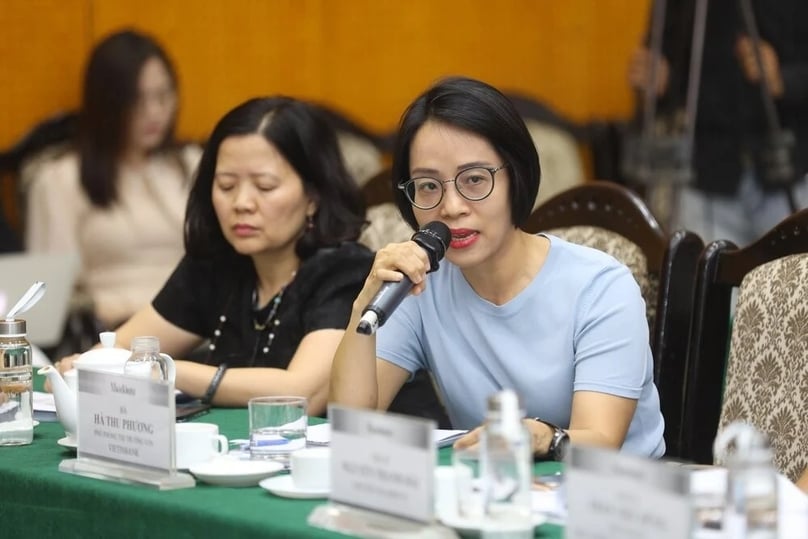
Ha Thi Thu Phuong, a representative of VietinBank. Photo by The Investor/Trong Hieu.
Nguyen Thien Huong, an official with the International Finance Corporation (IFC), mentioned a technical issue. She said green taxonomy needed updates via the Prime Minister's decisions, while the current regulations were set through decrees and other laws. Current international practice was that such rules are not stipulated, only relevant information was disseminated, Huong said.
Echoing this, Lai Van Manh, an official with the Institute of Strategy and Policy on Natural Resources and Environment, said Vietnam was ready to issue its green taxonomy framework, except for terms related to green recognition. The challenge was to decide on such terms to be included in the framework or make a standalone rule thereof.
- Read More
Southern Vietnan port establishes strategic partnership with Japan’s Port of Kobe
Long An International Port in Vietnam’s southern province of Tay Ninh and Japan’s Port of Kobe on Monday signed an MoU establishing a strategic port partnership which is expected to boost trade flows, cut logistics costs, and deliver greater benefits to businesses across the region.
Companies - Wed, November 19, 2025 | 10:14 am GMT+7
Thaco's agri arm seeks to expand $44 mln cattle project in central Vietnam
Truong Hai Agriculture JSC (Thaco Agri), the agriculture arm of conglomerate Thaco, looks to aggressively expand its flagship cattle farming project in the central Vietnam province of Gia Lai.
Industries - Wed, November 19, 2025 | 9:56 am GMT+7
Japan food major Acecook eyes new plant in southern Vietnam
Acecook, a leading instant noodle maker with 13 plants operating in Vietnam, is studying a new project in the southern province of Tay Ninh.
Industries - Wed, November 19, 2025 | 9:39 am GMT+7
Vietnam’s largest Aeon Mall to take shape in Dong Nai province
Authorities of Dong Nai province, a manufacturing hub in southern Vietnam, on Monday awarded an investment registration certificate to Japanese-invested Aeon Mall Vietnam Co., Ltd. for its Aeon Mall Bien Hoa project.
Industries - Tue, November 18, 2025 | 8:17 pm GMT+7
Police propose prosecuting Egroup CEO Nguyen Ngoc Thuy for fraud, bribery
Vietnam’s Ministry of Public Security has proposed prosecuting Nguyen Ngoc Thuy, chairman and CEO of Hanoi-based education group Egroup, along with 28 others, for fraud to appropriate property, giving bribes, and receiving bribes.
Society - Tue, November 18, 2025 | 4:01 pm GMT+7
Singapore-backed VSIP eyes large urban-industrial complex in southern Vietnam
A consortium involving VSIP, a joint venture between local developer Becamex IDC and Singapore’s Sembcorp, plans a large-scale urban-industrial development named the "Moc Bai Xuyen A complex along the Tay Ninh-Binh Duong economic corridor in southern Vietnam.
Industrial real estate - Tue, November 18, 2025 | 2:38 pm GMT+7
Aircraft maintenance giant Haeco to set up $360 mln complex in northern Vietnam
Hong Kong-based Haeco Group, Vietnam's Sun Group, and some other partners plan to invest $360 million in an aircraft maintenance, repair and overhaul (MRO) complex at Van Don International Airport in Quang Ninh province - home to UNESCO-recognized natural heritage site Ha Long Bay.
Industries - Tue, November 18, 2025 | 2:13 pm GMT+7
Thai firm opens 20,000-sqm shopping center in central Vietnam hub
MM Mega Market Vietnam (MMVN), a subsidiary of Thailand's TCC Group, on Monday opened its MM Supercenter Danang, a 20,000 sqm commercial complex with total investment capital of $20 million, in Danang city.
Real Estate - Tue, November 18, 2025 | 12:20 pm GMT+7
Vietnam PM asks Kuwait fund to expand investment in manufacturing, logistics, renewable energy
Prime Minister Pham Minh Chinh on Monday called on the Kuwait Fund for Arab Economic Development (KFAED) to strengthen cooperation with Vietnam, particularly in the areas of industrial production, logistics, renewable energy, green economy, and the Halal ecosystem.
Economy - Tue, November 18, 2025 | 11:53 am GMT+7
Thai dairy brand Betagen to build first plant in Vietnam
Betagen, a famous Thai dairy brand, plans to build its first manufacturing plant in Vietnam, located in the southern province of Dong Nai.
Industries - Tue, November 18, 2025 | 8:49 am GMT+7
Banks dominate Vietnam's Q3 earnings season, Novaland posts biggest loss
Banks accounted for more than half of the 20 most profitable listed companies in Vietnam’s Q3/2025 earnings season, while property developer Novaland recorded the largest loss.
Finance - Tue, November 18, 2025 | 8:24 am GMT+7
Highlands Coffee posts strongest quarterly earnings in 2 years on robust same-store sales
Highlands Coffee, Vietnam’s largest coffee chain, delivered its best quarterly performance in two years, with Q3 EBITDA exceeding PHP666 million ($11.27 million), parent company Jollibee Foods Corporation (JFC) said in its latest earnings report.
Companies - Mon, November 17, 2025 | 10:21 pm GMT+7
Hong Kong firm Dynamic Invest Group acquires 5% stake in Vingroup-backed VinEnergo
VinEnergo, an energy company backed by Vingroup chairman Pham Nhat Vuong, has added a new foreign shareholder after Hong Kong–based Dynamic Invest Group Ltd. acquired a 5% stake, according to a regulatory filing on Saturday.
Companies - Mon, November 17, 2025 | 9:52 pm GMT+7
Thai giant CP’s Q3 Vietnam revenue drops 20% as hog prices slump
Thailand’s Charoen Pokphand Foods PCL (CPF) reported a sharp downturn in its Vietnam business in Q3, making the country its only major market to contract.
Companies - Mon, November 17, 2025 | 4:16 pm GMT+7
Surging demand for gas turbines tightens supply chains, extends lead times: Siemens Energy
Demand for gas turbines is rising rapidly, especially in regions with a surge in data center development, tightening supply chains and extending lead times - factors that investors must closely track during project preparation, according to Siemens Energy.
Companies - Mon, November 17, 2025 | 1:34 pm GMT+7
Novaland completes first phase of restructuring, targets 'returning to growth' from 2027
Novaland, a leading real estate developer in Vietnam, said it has completed the first phase of its multi-year restructuring plan and aims to finish the entire program by end-2026, positioning the company to return to growth from 2027.
Companies - Mon, November 17, 2025 | 12:26 pm GMT+7


























